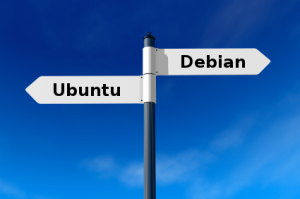Debian or Ubuntu: who to help?
- Transfer
 From a user’s point of view, it’s relatively easy to choose between Debian and Ubuntu. Everyone has their own personal preferences, and it will not take too long to try both OSs. But when it comes to contributing to development, it will take a lot more time for this, and you will probably want to think about it twice before you start. So which system is better to spend your time on?
From a user’s point of view, it’s relatively easy to choose between Debian and Ubuntu. Everyone has their own personal preferences, and it will not take too long to try both OSs. But when it comes to contributing to development, it will take a lot more time for this, and you will probably want to think about it twice before you start. So which system is better to spend your time on? This is a difficult question, to which there is no answer that would satisfy everyone. It all depends on your incentive to participate in the development.
Ubuntu: better for beginners?
On the one hand, you probably started with a more user-friendly system - Ubuntu. You like it and would like to repay the project with something, for example, with your contribution to the development. Perfect solution!
Also, if you are not one of those people who like to study (mostly) alone, Ubuntu will likely be the best place to contribute (at least in the beginning). With Ubuntu Developer Week , as well as the work of the Ubuntu community managers, you will find more help for new members than Debian.
Debian: high principles?
On the other hand, as soon as you become a regular contributor, you will remain forever thanks to the community and those principles that unite you.
Lucas Nussbaum (who is the developer of both Ubuntu and Debian) said in a speech at mini-debconf in Paris that the Debian community has higher principles, since this is exclusively volunteer work, while Canonical has a significant impact on Ubuntu.
This was again demonstrated a few days ago by the story of Banshee and related affiliates of Amazon affiliates. I liked Mark Shuttleworth’s clarifications on this subject, but the story nonetheless proves that the power of the Ubuntu community has its limits.
Returning to the topic of the article, on a more fundamental level, in many cases, Debian is the right system to contribute, even when you really want to help Ubuntu. Whenever you work on 75% of the packages that came directly from Debian, it is in the interest of Ubuntu not to create any discrepancy with Debian. That is, any bugfix that you would like to make should ideally be included in the official Debian package (or directly in upstream).
And while doing work for Debian, you are working in the interests of more people, as your work will fall into all Debian-derived distributions (and not just Ubuntu and its descendants).
Why contribute?
Debian has a clear answer: the Debian Social Contract . If you contribute to the development of Debian, it usually helps to achieve a high goal: to bring users a universal high-quality OS.
If we talk about Ubuntu, everything here does not look so clear. Where is the document linking people together? Bug # 1 , which says that Microsoft should not have an advantage in the market? Or a code of ethics ?
Invest in both
In conclusion, I would like to point out the obvious. There is no need to help just one system. You can develop for both systems, as many do. Just contribute when it makes sense.
Contribute to the development of Debian when deep infrastructure changes are required, where discrepancies are to be avoided, or when you plan to change a package that has not yet been changed in Ubuntu.
Contribute to Ubuntu development when you work on projects that are already seriously customized (or even forked), or when you work on new experimental projects that cannot be included in Debian.
But we must remember that the choice exists and ask yourself, whenever you are going to contribute something to this OS.
about the author: Rafael Herzog is a Debian developer. He is working on a package manager (dpkg). He also runs a monthly newsletter where he shares his thoughts on news about Debian and Ubuntu.
From a translator: This is my first article translation, corrections and criticism are welcome
